To view the data inside MNESIA you could :
- Write a simple Erlang program as this, as result you have:
(rabbit@gabrieles-MBP)5>
load:traverse_table_and_show('rabbit_delayed_messagerabbit@gabrieles-MBP').
{delay_entry,
{delay_key,1442258857832,
{exchange,
{resource,<<"/">>,exchange,<<"my-exchange">>},
'x-delayed-message',true,false,false,
[{<<"x-delayed-type">>,longstr,<<"direct">>}],
undefined,undefined, {[],[]}}},
{delivery,false,false,<0.2008.0>,
{basic_message,
{resource,<<"/">>,exchange,<<"my-exchange">>},
[<<>>],
{content,60,
{'P_basic',undefined,undefined,
[{<<"x-delay">>,signedint,100000}],
undefined,undefined,undefined,undefined,undefined,
undefined,undefined,undefined,undefined,undefined,
undefined},
..
OR in this way:
execute an Erlang shell session using:
erl -set-cookie ABCDEFGHI -sname monitorNode@gabrielesMBP
you have to use the same cookie that rabbitmq are using.
Typically $(HOME).erlang.cookie
- execute this command:
observer:start().
and you should have this:

Once you are connected to rabbitmq node open Table Viewer and from the menu Mnesia table as:

Here you can see your data:



